Serving 533 students in grades 6-12, Connecticut River Academy At Goodwin University ranks in the bottom 50% of all schools in Connecticut for overall test scores (math proficiency is bottom 50%, and reading proficiency is bottom 50%).
The percentage of students achieving proficiency in math was 6-9% (which was lower than the Connecticut state average of 39%). The percentage of students achieving proficiency in reading/language arts was 30-34% (which was lower than the Connecticut state average of 51%).
The student:teacher ratio of 14:1 was higher than the Connecticut state level of 12:1.
Minority enrollment was 86% of the student body (majority Hispanic), which was higher than the Connecticut state average of 53% (majority Hispanic).
School Overview
Grades Offered
Grades 6-12
(offers virtual instruction)
(offers virtual instruction)
Total Students
533 students
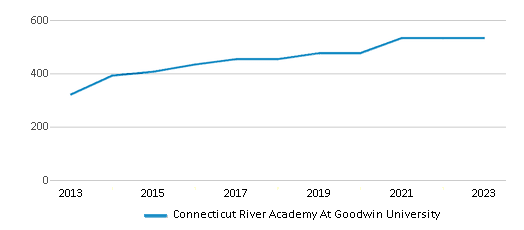
Gender %
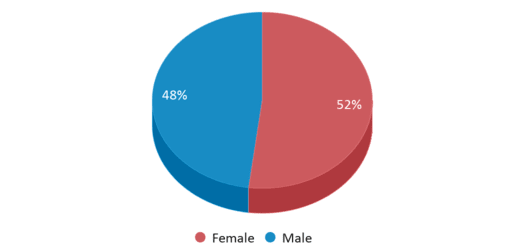
Total Classroom Teachers
38 teachers
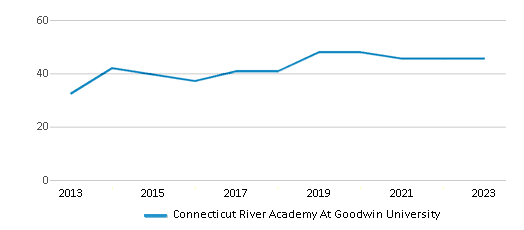
Students by Grade
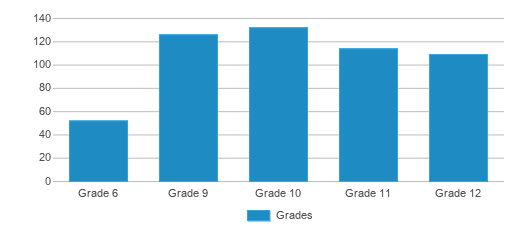
School Rankings
Math Test Scores (% Proficient)
(20-21)6-9%
39%
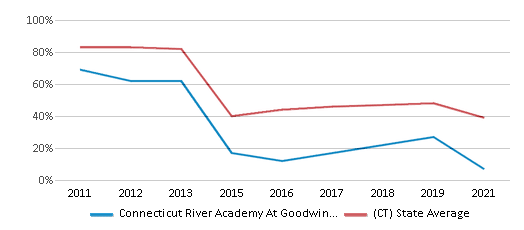
Reading/Language Arts Test Scores (% Proficient)
(20-21)30-34%
51%
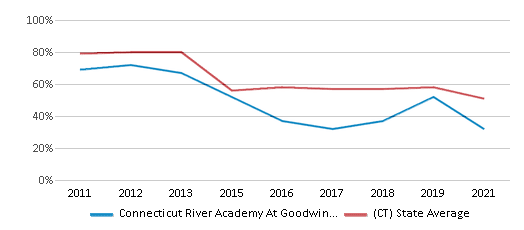
Science Test Scores (% Proficient)
(20-21)35-39%
49%
Student : Teacher Ratio
14:1
12:1
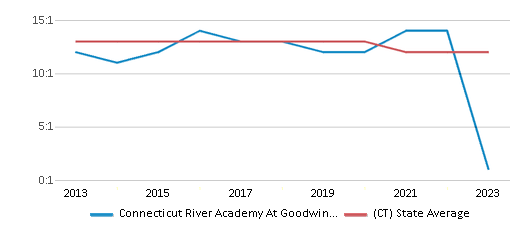
American Indian
n/a
n/a
Asian
4%
5%
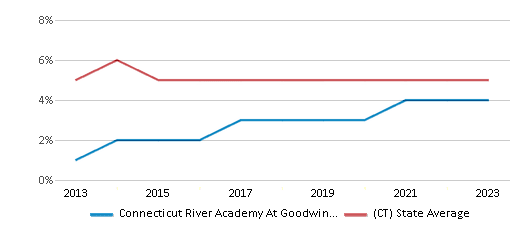
Hispanic
54%
31%
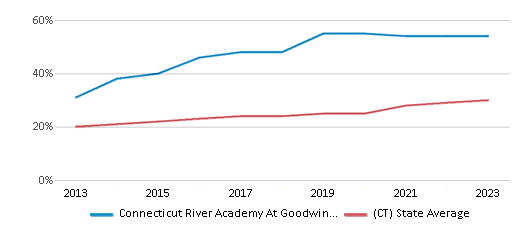
Black
25%
12%
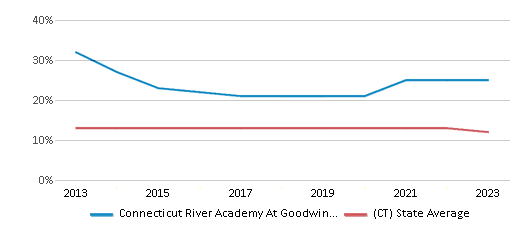
White
14%
47%
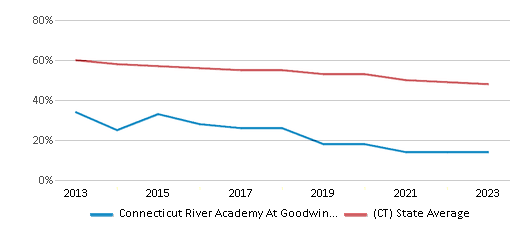
Hawaiian
n/a
n/a
Two or more races
3%
5%
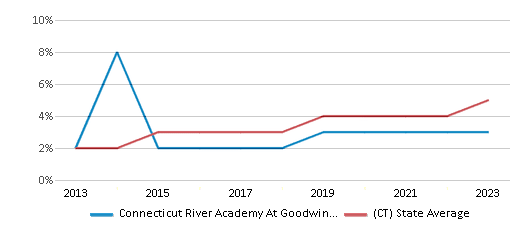
All Ethnic Groups
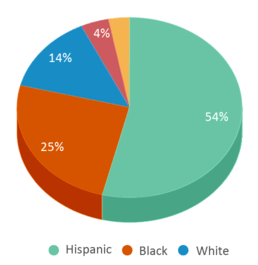
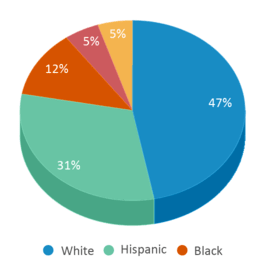
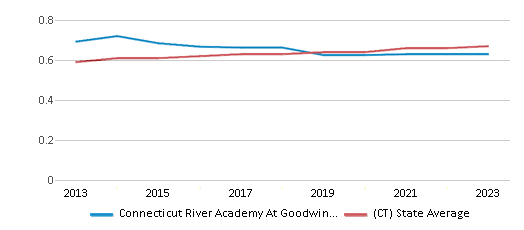
Graduation Rate
(20-21)≥95%
90%
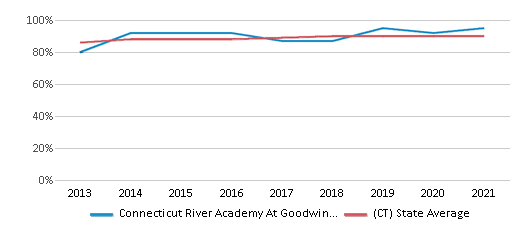
Eligible for Free Lunch
61%
37%
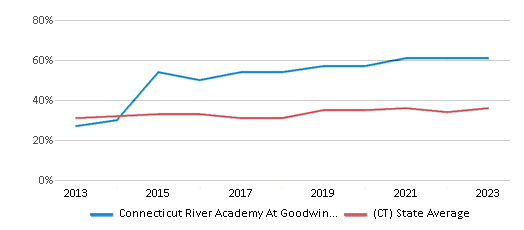
Eligible for Reduced Lunch
16%
6%
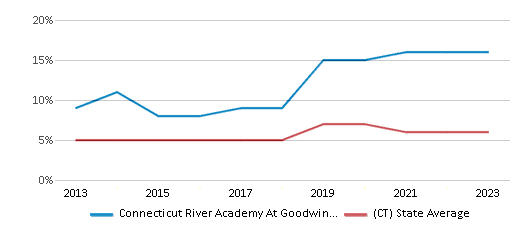
School Statewide Testing
School District Name
Sports
Total Sports Offered
3 sports
Sports
Basketball, Soccer, Volley Ball
Source: National Center for Education Statistics (NCES), CT Dept. of Education
School Notes
- At Connecticut River Academy (CTRA), students get a jump-start on their college career. In addition to a full range of high school courses, students have the opportunity to take classes at Goodwin University and earn up to 35 transferable college credits while still in high school - all at no tuition cost. Students are prepared academically and socially for college - laying an important foundation for future success.
Frequently Asked Questions
What percent of students have achieved state testing proficiency in math and reading?
6-9% of students have achieved math proficiency (compared to the 39% CT state average), while 30-34% of students have achieved reading proficiency (compared to the 51% CT state average).
What is the graduation rate of Connecticut River Academy At Goodwin University?
The graduation rate of Connecticut River Academy At Goodwin University is 95%, which is higher than the Connecticut state average of 90%.
How many students attend Connecticut River Academy At Goodwin University?
533 students attend Connecticut River Academy At Goodwin University.
What is the racial composition of the student body?
54% of Connecticut River Academy At Goodwin University students are Hispanic, 25% of students are Black, 14% of students are White, 4% of students are Asian, and 3% of students are Two or more races.
What is the student:teacher ratio of Connecticut River Academy At Goodwin University?
Connecticut River Academy At Goodwin University has a student ration of 14:1, which is higher than the Connecticut state average of 12:1.
What grades does Connecticut River Academy At Goodwin University offer ?
Connecticut River Academy At Goodwin University offers enrollment in grades 6-12 (offers virtual instruction).
What school district is Connecticut River Academy At Goodwin University part of?
Connecticut River Academy At Goodwin University is part of Learn School District.
Recent Articles

Segregation in K-12 Education: Colonial Era
Explore the origins of educational segregation during the colonial era and the differential treatment of Native American, African American, and white students. This article delves into the historical context, policies, and societal attitudes that shaped early education in colonial America, highlighting the disparities and injustices that persisted within the schooling systems of that time.

Segregation in K-12 Education: The Jim Crow Era
This article delves into the segregated schooling system that existed during the Jim Crow Era, examining the disparities faced by African American students.
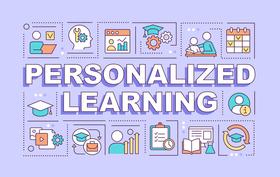
December 16, 2024
Personalized Learning: Revolutionizing Education for the 21st CenturyExplore the revolutionary approach of Personalized Learning in K-12 education. This article discusses the benefits, challenges, and potential of tailoring education to individual student needs, incorporating technology and adaptive learning methods to prepare students for the 21st century.





